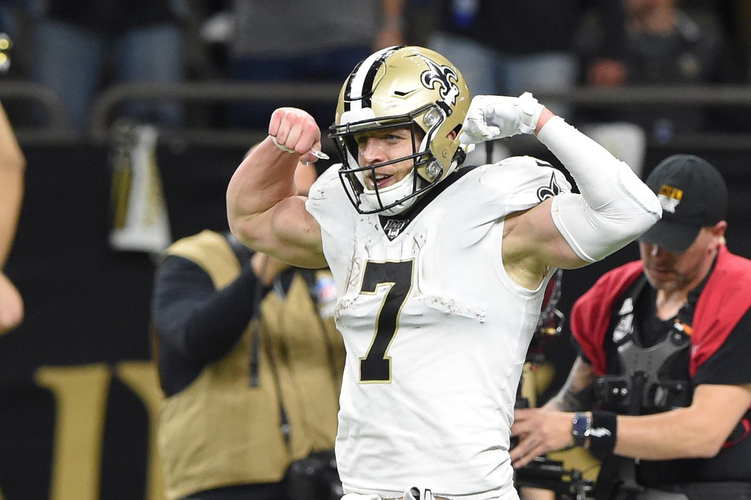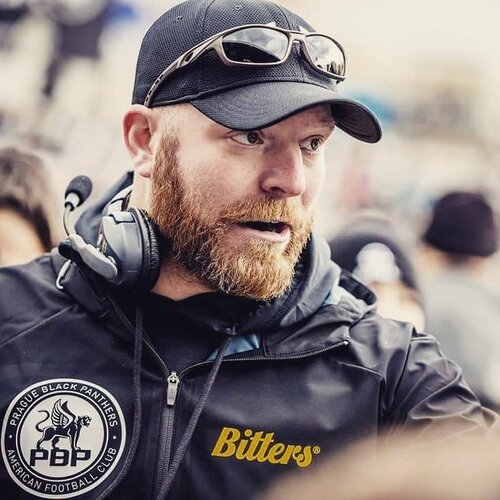
Credit: John David Mercer - USA Today Sports
 By Dan Levy - Staff Writer - Saintsreport.com
By Dan Levy - Staff Writer - Saintsreport.com Speaking to reporters at the NFL Annual League Meeting, new Head Coach Dennis Allen made some waves in what has been an otherwise placid Saints offseason when he touched on his vision for Taysom Hill.
"Taysom is going to be more of the F tight end, move tight end," adding that he believes that Hill can be one of the best players in the league in this role.
While I personally feel this straightforward answer to a simple question has attracted a disproportionate flood of speculation and hot takes, it is still a significant--albeit somewhat predictable--clarification of the new coach's vision for one of the most intriguing (and divisive) hybrid players in recent years.
In PART 1 of this two-part analysis, I will discuss what fans can expect from this stated change to Taysom Hill's role.
What does this all mean, and why is it happening?
During Hill's tenure as a Saint, he has captured the imaginations of fans, media, coaches, and probably earned himself a roster spot (at least early on) through a willingness to be a football player, wielding his playmaking ability across a variety of positions on offense and just about every special teams unit. And though he has enthusiastically accepted this jack-of-all-trades role for the betterment of the team, Hill has also been very clear that his ultimate goal is to be an NFL quarterback. I won't waste time trying to dissect his mindset or feelings regarding this purported narrowing of his role, but it is important to understand what this move means, and why it is happening.
Starting, first, with the implications: Will we see a significant change in Hill's role on gameday?
- The simple answer is no. The F position, which is your standard flex tight end/H-back, has been Hill's primary offensive role for the last few years now, where he has been used rather traditionally as a kick-out blocker on the backside of zone and playside of power, worked the flats and seams in the passing game, and flexed out wide as a detached receiver here and there. We should expect this to continue, as well as his specialization as the 11-man run game QB (the Wildcat, if you will). I would even expect his snap distribution in those roles to remain pretty much the same, with his total snap count probably increasing.
- The real changes will play out during the week: on the practice field and in meeting rooms. The most grounded extrapolation to be made from Allen's statement is that Taysom Hill will no longer be spread as thin as he has been in previous seasons, when he divided his very finite time between the QB, ST, and skilled position meeting rooms and individual periods. His QB package will likely be sent to him at the beginning of the week electronically, and he'll head out to the practice field early for a quick informal discussion with the coaches, where they can cover any new variations being installed. This, coupled with a 5-10 minute period in practice to rep said package, will likely be the extent of his QB exposure during a regular gameweek.
If he commits himself as doggedly to the craft of blocking and route-running as he did to the craft of QB play, I see no reason why Taysom Hill can't become an even more dominant playmaker with a more well-rounded game, while still stressing defenses in unique ways due to his ability to go under center at a moment's notice.
Now, to the punditry's more preferred question (and fodder for all their hot takes): Why is this happening?
The low-hanging-fruit explanation is that Hill simply didn't cut it as a QB, or that Allen is the new sheriff in town, putting his stamp on the team, departing from his mentor's willingness to invest in the Taysom Hill QB experiment. I disagree with this oversimplification... but more on that later.
When you put the question into the context of football realities--and hard coach/player decisions--it really breaks down into three major factors.
- Needs of the Team & Organization.
- I separate team and organization here, but they are two parts of the same whole, working in concert. The team is thin on offense, and the organization is short on cash (at least in salary cap terms). There have been no major additions to that side of the ball, and, as we saw last season, the receiver group is not bringing much to the table after Michael Thomas.
- Can Taysom Hill contribute to the receiver group while continuing to devote a large amount of his time to QB? Yeah, sure. Can he contribute more if his focus is no longer divided--particularly between skilled positions, special teams, and the unrelenting demands of a QB? Logic says, Yes.
- Injuries.
- I want to start by saying that Taysom Hill is one tough SOB--easily one of the toughest players in the NFL. He played most of last season with a lisfranc injury, which miraculously didn't seem to affect his ability to run and truck until the final game (anyone who has had this injury knows it's no joke). He also played QB with a torn ligament in his finger, and somehow kept throwing spirals.
- As if that weren't enough to prove his demigod-level pain tolerance, the dude is the only QB in the NFL (that I've noticed) who plays without a rib protector. That's, like, one step below playing without a facemask--especially at a position where you're constantly at risk of blindside shots to the ribs and lower back.
- That said, Hill is undeniably injury prone. The punditry will tell you that this is due to his playing style, but this is at best a half-truth. Hill isn't being knocked out of games on plays where he lowered his shoulder on a safety, iso-blocked a linebacker, or went airborne into the end zone. His one concussion aside (which was inflicted on a blow to the head while he was going up for a pass--kind of irrelevant to his hard-nosed playing style), Taysom's injuries have been of the soft-tissue variety. The lisfranc, the tendon in his finger, and other ligament injuries dating all the way back to his days at BYU.
- These nagging soft-tissue injuries are often falsely attributed to the catch-all of "playing style"--especially when it comes to athletic QBs. The truth is they're mostly genetic. I'm not a physician or a trainer, but I am a coach, and when a player has a history of ligament, tendon, and muscle injuries, there is no simple solution. Sure, specific training regimens can help mitigate the outcomes, and with that + a little luck, Hill may play for another ten years and not miss another game. But if there is one position where a team really can't afford an injury-prone player, it's QB.
- I want to start by saying that Taysom Hill is one tough SOB--easily one of the toughest players in the NFL. He played most of last season with a lisfranc injury, which miraculously didn't seem to affect his ability to run and truck until the final game (anyone who has had this injury knows it's no joke). He also played QB with a torn ligament in his finger, and somehow kept throwing spirals.
- Versatility.
- It's been said that "beauty is a curse," and the same can be said for versatility at the QB position. In the long history of the NFL, there has been many an athletic college QB who willingly converted to another position. There have also been many who refused (Tim Tebow comes to mind) and thus cut their careers short.
- Hill is unique among this group in that he has proven himself as an NFL QB. And while that statement may be "controversial," it is simply true. Yes, there is a reasonable debate to be had regarding the quality of NFL QB he is (franchise player, starter, journeyman backup, etc.), but you simply do not go 7-2 as a starting QB and complete 65% of your 270 passing attempts if you are not an NFL-caliber QB.
- The truth is that Hill's willingness to do whatever the team needed probably earned him a roster spot early in his career, but it has also hurt his QB aspirations. Nobody is going to ask Andy Dalton to play WR. There will be no debates about whether Ian Book should be lining up at RB instead of holding a clipboard. With respect to Taysom Hill's QB career, his demonstrated versatility will always be his curse.
- Going back to team + organization, Hill is a dynamic skill player on a team currently deplete dynamic skill players. He also has a $40-million contract. If the Saints want to win games, they're going to have him on the field--and they're going to put him in position to perform at his peak, which means focusing him on the role where he can have the biggest impact.
- It's been said that "beauty is a curse," and the same can be said for versatility at the QB position. In the long history of the NFL, there has been many an athletic college QB who willingly converted to another position. There have also been many who refused (Tim Tebow comes to mind) and thus cut their careers short.
It's important to reiterate that Taysom HIll is a good QB. He is mechanically crisp, accurate, processes information quickly, and really is a natural thrower. He's also uniquely athletic and brings a lot to an offense in terms of his ability to stress defenses. In my assessment, he could certainly be a starting QB in the NFL.
Unfortunately for him, he will always be stigmatized--perhaps unfairly--as "not a real QB." And his injury issues are enough to make most teams shy away.
The Saints have a reliable starter in Jameis Winston, who rightly earned the job last season and performed admirably. Adding Andy Dalton provides a quality backup who has proven he can win games--something the Saints were sorely missing last year. Again, the sad truth for Hill is the Saints no longer need him at QB--they need him elsewhere.
Dennis Allen made the right decision--a decision which will undoubtedly affect the Saints outlook going into the draft.
But that's a topic for PART 2.


